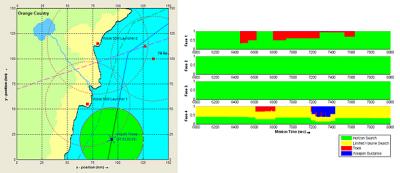MSc thesis project proposal
Mission-driven Radar Dwell Scheduling
Advanced multi-functional radars systems with phased array antennas are able to execute multiple tasks simultaneously and adapt the provided qualities according to the needs. To successfully complete all the functions requires to constantly schedule the tasks (in run-time). Radar schedulers are usually optimizing system characteristics (e.g. detection probability, tracking accuracy). However, end-user are actually interested in other parameters for optimization (e.g. mission success). It is a scientific challenge to connect (i.e. translate) the short-term decisions of the radar (e.g. to which direction should the radar transmit a radio wave?) to the long-term results (e.g. is the ship undamaged?). Optimizing run-time radar tasks requires fast algorithms that cannot incorporate usually complicated calculations. Moreover, the radar systems are so reconfigurable, that there are too many degrees of freedom for an algorithm to optimize. Therefore, the short-term control should be simple, but preferably optimal for the long-term mission success.
Initial reading: F. Bolderheij, "Mission-Driven Sensor Management," Ph.D. dissertation, Delft University of Technology, Delft, 2007
Assignment
The goal of the project is to evaluate current (short-term) scheduling techniques from a (long-term) mission point of view, select the best one and preferably even present new techniques that are resulting in better mission results. This will require an adequate literature survey and proper model development. In the end, the proposed should be usable for multi-radar stations or even radar networks. The solution will contribute to a solution in which end-users can use radar systems are their full potential.Requirements
MATLAB, radar basics, optimization algorithmsContact
dr. Oleg Krasnov
Microwave Sensing, Signals and Systems Group
Department of Microelectronics
Last modified: 2019-11-20
